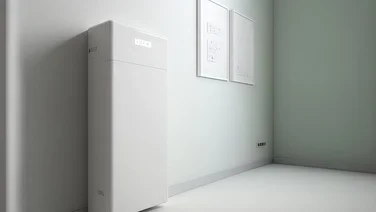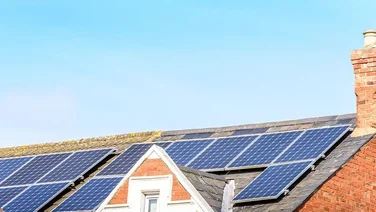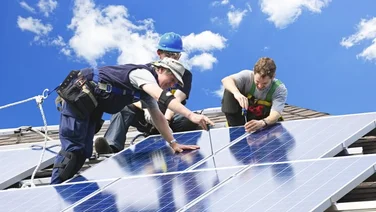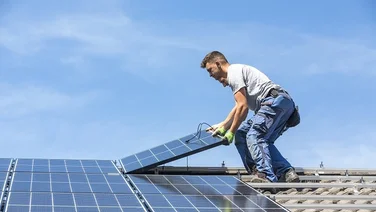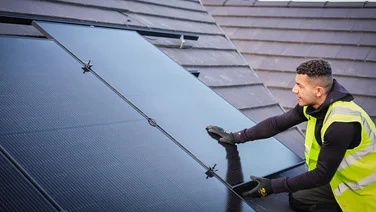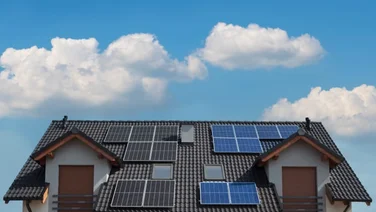We receive a small fee from trusted installers when you request a quote through our site. This helps us keep our content independent, well-researched and up to date – Learn more
✔ Solar panels produce 24% less electricity under light cloud
✔ Under heavy cloud, solar panels produce 67% less electricity
✔ Heavy rain can reduce solar panel electricity output by 80% to 90%
Not everyone lives somewhere sunny, but a lot of people are interested in getting solar panels. It’s normal to wonder if they’ll work on cloudy days.
Clouds and rain can affect solar panel performance in various ways, as well as how solar panels work, and we’ll explain how and why in this article. We’ll also go over whether it’s worth getting solar panels if you live in a cloudy place, and how much electricity they’ll produce in cloudy weather.
Think solar panels are a good fit for you? We can help you find an installer. Just fill out our short form with a few details, and we’ll pass them onto professional solar panel installers. They’ll be in touch with quotes.
Where do you want to install solar panels?
Get started
Do solar panels work in cloudy weather?
Yes, solar panels work in cloudy weather, from light clouds to heavy clouds.
A popular saying is that solar panels need ‘daylight, not sunlight.’ Now, of course solar panels operate on sunlight, but they don’t actually need the sun to be shining on them to work.
Cloud cover doesn’t completely block out the sun’s rays, otherwise it would be totally dark on cloudy days. Instead, the clouds filter out some of the sun’s rays, but not enough to stop your solar panels from operating.
Since solar panels receive less direct sunlight on cloudy days, they produce less electricity on overcast days, compared to sunny ones.
Under light cloud cover, solar panels produce around 24% less electricity than on sunny days, while under heavy clouds they produce 67% less, according to an International Journal of Engineering Science and Computing study.
What is the ‘edge of cloud’ effect?
The ‘edge of cloud’ effect is when a passing cloud causes a short spike in solar panels electricity generation.
This phenomenon happens when water droplets in the cloud magnify the sun’s rays, and reflect them back onto the panels as they pass.
This creates a short surge in the amount of solar radiation (the energy emitted by the sun) hitting the panels, and leads to a temporary rise in electricity production.
How much electricity do solar panels produce in cloudy weather?
How much electricity solar panels produce in cloudy weather will depend on the density of the clouds.
In the UK, on a mildly overcast day, one 350 watt (W) solar panel will produce roughly 0.55 kilowatt hours (kWh) of electricity. On a heavily overcast day, that same solar panel’s output will decrease to around 0.24 kWh.
For context, the average daily output – in changeable conditions – of a 350 W solar panel in the UK is 0.72 kWh.
In ideal conditions, a 350 W solar panel can potentially generate roughly 4.27 kWh over the course of a day. But this would only be possible if the sun shone uninterrupted from morning till evening, and if the solar panel was fixed with a tracker that rotated its angle to face the sun at all times.
Where do you want to install solar panels?
Get started
Is it still worth getting solar panels if you live in a cloudy place?
Yes, solar panels are still worth getting if you live in a cloudy place.
While they won’t generate as much electricity as they would if you lived somewhere sunny – such as Arizona – they’ll still produce enough to lower your bills and reduce your carbon footprint.
For example, in the UK, the average person living in a three-bedroom house can expect to save around £454 a year on electricity bills, and break even on their purchase in around 15.66 years.
You can read more about the benefits of solar panels by going to our page, Are Solar Panels Worth It?
Do solar panels work on rainy days?
Yes, solar panels work on rainy days, but they generate less electricity than they would on sunny days. How much less depends on the density of the clouds and the amount of rain.
In light rain, solar panel output will be similar to what it is under light cloud cover: around 24% less electricity than on a sunny day.
Plus, rain water can actually help solar panels stay efficient by cleaning dirt and debris off them. Without rain, dirt can build up and limit the amount of light reaching the panels, meaning they’ll generate less electricity.
Heavy rain, on the other hand, can reduce solar panel output by 80% to 90% relative to their maximum capacity, according to Energy Nordic.
This is for two reasons. Firstly, heavy rain is usually coupled with heavy cloud cover, which blocks out a lot of light.
The second reason is heavy rain leaves big water droplets on solar panels, which, coupled with heavy clouds, will stop even more light from reaching the panels.
Do solar panels work at night?
No, solar panels do not work at night, since they require the sun’s rays to operate.
These hit the Earth’s surface during the day, even on overcast or rainy days, when a few are filtered out by the clouds. This isn’t the case at night, which is why it’s dark.
Technically, solar panels could work at night, since moonlight is technically just sunlight being reflected off the moon’s surface.
However, the solar radiation the moon emits isn’t powerful enough to trigger a strong response from the solar cells inside the panels. Just think of how bright the sun is compared to the moon.
Next steps
There you have it: solar panels absolutely work on cloudy days. They might not perform their best in cloudy weather, but they’ll still generate enough electricity to cut a chunk out of the average household’s bills.
If that’s calmed your worries and you’re ready to get solar panels, we can help. Just fill in our quote form with a few details. Our network of solar panels installers will be in touch soon to offer you their best prices.
FAQs
What are the best solar panels for overcast conditions?
The best solar panels for overcast conditions are highly efficient monocrystalline panels. Since solar panels generate less electricity in overcast conditions compared to sunny ones, getting the most efficient solar panels possible is the best way to maximise electricity production in less-than-ideal conditions. For context, monocrystalline solar panels are the most efficient type of solar panel that’s commercially available, with some models reaching up to 24% efficiency. Solar panels are 20% efficient, on average.
Are solar panels better in winter or summer?
Solar panels work better in summer than in winter in the UK, because solar panels are exposed to more indirect and direct sunlight. This is mainly because there are more hours of daylight and less overcast days in the summer than in winter.
Solar panels still work in winter, but their electricity output is reduced by around 83% compared to the summer.

